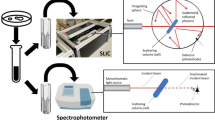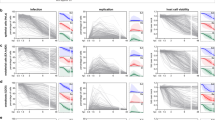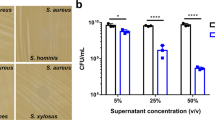Abstract
CONVENTIONAL antibiotic sensitivity tests require many hours for accurate interpretation. We have now discovered a means of detecting the effects of the antibiotic penicillin on viable bacteria within minutes, by observing changes in the differential light scattered from bacterial suspensions. Sensitivity to penicillin in Staphylococcus aureus is detectable in as little as 3 min after the addition of the antibiotic.
This is a preview of subscription content, access via your institution
Access options
Subscribe to this journal
Receive 51 print issues and online access
$199.00 per year
only $3.90 per issue
Buy this article
- Purchase on Springer Link
- Instant access to full article PDF
Prices may be subject to local taxes which are calculated during checkout
Similar content being viewed by others
References
Greenwood, D., and O'Grady, F., Science, 163, 1076 (1959).
Wyatt, P. J., Applied Optics, 7, 1879 (1968).
Wyatt, P. J., Nature, 221, 1257 (1969).
Wyatt, P. J., Nature, 226, 277 (1970).
Author information
Authors and Affiliations
Rights and permissions
About this article
Cite this article
BERKMAN, R., WYATT, P. & PHILLIPS, D. Rapid Detection of Penicillin Sensitivity in Staphylococcus aureus. Nature 228, 458–460 (1970). https://doi.org/10.1038/228458a0
Received:
Issue Date:
DOI: https://doi.org/10.1038/228458a0
This article is cited by
-
Phenotypic antibiotic susceptibility testing of pathogenic bacteria using photonic readout methods: recent achievements and impact
Applied Microbiology and Biotechnology (2019)
Comments
By submitting a comment you agree to abide by our Terms and Community Guidelines. If you find something abusive or that does not comply with our terms or guidelines please flag it as inappropriate.



